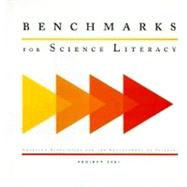
Note: Supplemental materials are not guaranteed with Rental or Used book purchases.
Purchase Benefits
| Preface | |
| About Benchmarks | |
| Benchmarks | p. 1 |
| The Nature of Science | p. 3 |
| The Nature of Mathematics | p. 23 |
| The Nature of Technology | p. 41 |
| The Physical Setting | p. 59 |
| The Living Environment | p. 99 |
| The Human Organism | p. 127 |
| Human Society | p. 151 |
| The Designed World | p. 181 |
| The Mathematical World | p. 209 |
| Historical Perspectives | p. 237 |
| Common Themes | p. 261 |
| Habits of Mind | p. 281 |
| Background | |
| The Origin of Benchmarks | p. 303 |
| Issues and Language | p. 311 |
| The Research Base | p. 327 |
| Beyond Benchmarks | p. 379 |
| Participants | p. 389 |
| Index | p. 398 |
| Table of Contents provided by Blackwell. All Rights Reserved. |
The New copy of this book will include any supplemental materials advertised. Please check the title of the book to determine if it should include any access cards, study guides, lab manuals, CDs, etc.
The Used, Rental and eBook copies of this book are not guaranteed to include any supplemental materials. Typically, only the book itself is included. This is true even if the title states it includes any access cards, study guides, lab manuals, CDs, etc.